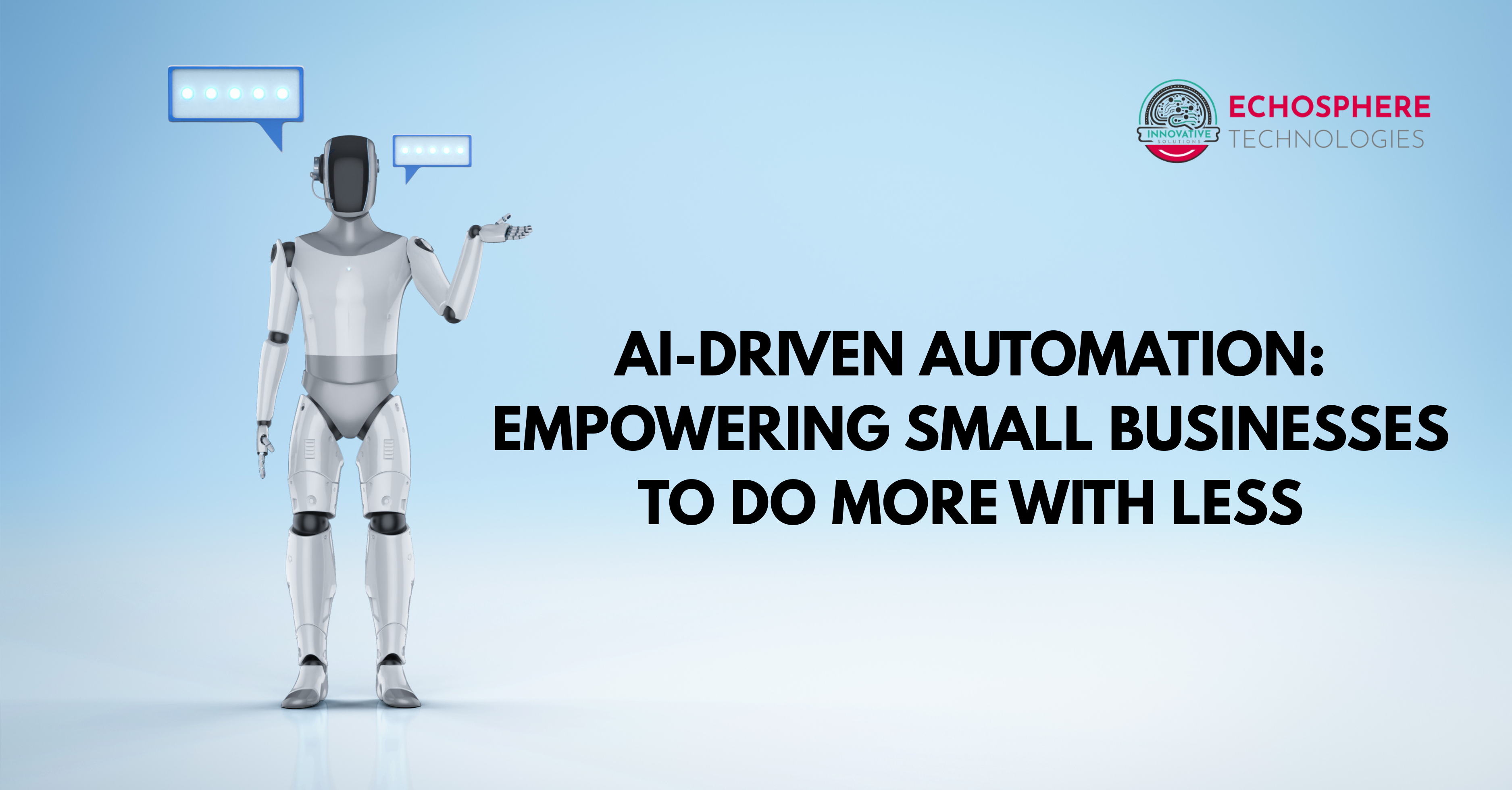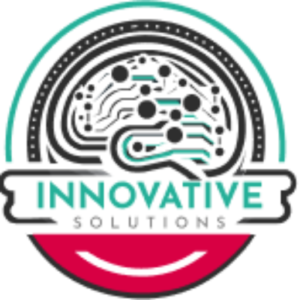Artificial intelligence is no longer the exclusive domain of tech giants – it’s rapidly becoming a powerful tool for small businesses too. In fact, over half of today’s small companies already use AI-powered tools. According to the U.S. Small Business Administration, 53% of small businesses now use AI chatbots and virtual assistants for customer service. Sales surveys echo this trend: Salesforce reports that 75% of SMBs are investing in AI solutions. These figures show a clear shift: small teams are turning to smart automation to streamline operations, reduce manual work, and extend their capabilities.
Short on staff and budget, small businesses need every efficiency they can get. AI can handle routine tasks, freeing people for higher‑value work. For example, chatbots can answer customer inquiries instantly, and virtual assistants can schedule appointments or send reminders – all without human intervention. Generative AI (like large language models) can draft emails, product descriptions or social posts in seconds. Data‑driven AI tools can analyze sales trends or automate inventory forecasts. By automating repetitive processes, small teams can do more with the same resources. (As the SBA notes, AI “helps businesses streamline processes, limit human error, and enable employees to complete everyday tasks faster”.)
It’s no surprise that this surge in AI adoption comes with clear payoffs. In a new SMB research report by Salesforce, 85% of businesses using AI say they expect a positive return on that investment. Even more strikingly, 91% of SMBs that have deployed AI report revenue gains. In other words, nearly every small business using AI sees concrete benefits – faster growth, higher efficiency, or cost savings. Moreover, nine out of ten small businesses with AI say it’s made operations more efficient[1]. These numbers aren’t hype – they reflect real results seen in the market.
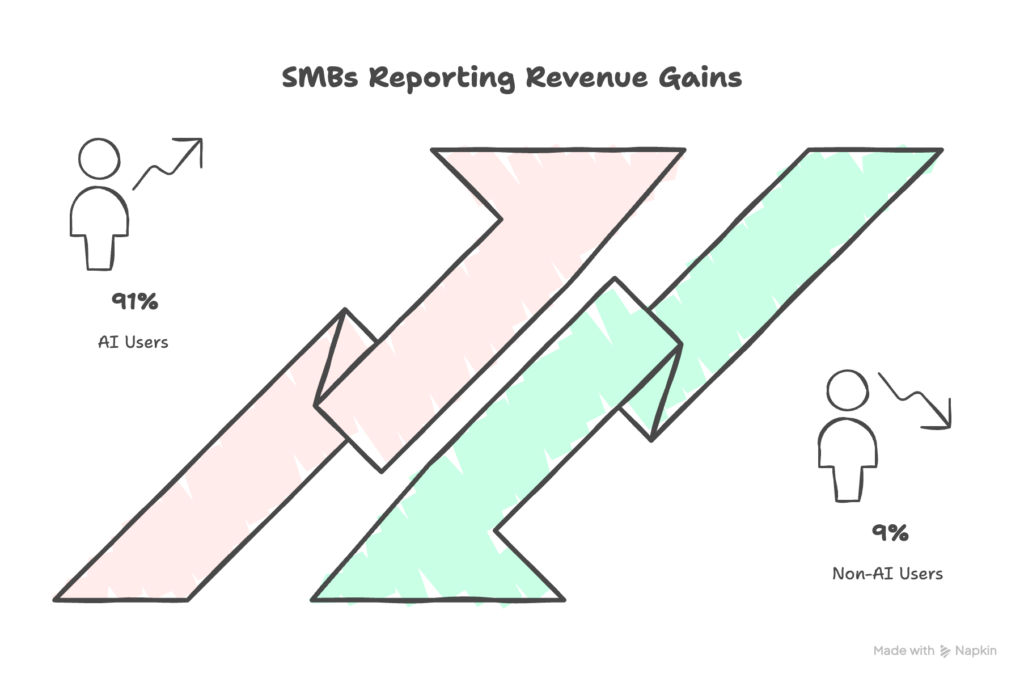
24/7 Customer Support: Chatbots and Virtual Assistants
AI chatbots and voice assistants now work around the clock. A single virtual agent can instantly handle common customer questions (hours, pricing, status) and route complex issues to a human. Small shops can offer “always-on” support without hiring extra staff. For example, a website chatbot can answer queries at midnight or on weekends, ensuring no lead goes unanswered. Over time it “learns” from each interaction, improving responses. According to the SBA, 53% of small businesses already leverage AI-powered chatbots or voice assistants for exactly this purpose. In practice, that means faster replies, happier customers, and a lighter load for your team.
Consider a local retailer that adds a chatbot to its Facebook Messenger. It can greet visitors, recommend products, and even take orders when staff are busy. Or a service provider who uses a voice assistant (like Alexa or Google Home) to schedule appointments: simply saying “Book a meeting on Tuesday” can prompt the AI to check calendars and send invites. These tools reduce friction. Instead of emailing back and forth, an AI assistant confirms details immediately. Staff then have more time to focus on high-priority tasks. In short, automated support and scheduling free up human agents for strategic work – a big productivity boost for any small team.
Automating Routine Operations with AI
Small businesses juggle many repetitive tasks beyond customer chat. AI can step in across the board. For example:
- Automated Scheduling and Reminders: Apps like AI meeting schedulers handle the “find a time” grind. They scan multiple calendars, propose slots, and even send follow-up reminders.
- Email and Notification Automation: AI tools can auto-send personalized email campaigns and notifications based on customer behavior or preset triggers, keeping audiences engaged without manual effort.
- Inventory and Finance: AI-driven analytics can forecast demand and suggest when to reorder stock, or flag unusual expenses in real time. This reduces waste and bookkeeping errors.
- Document Processing: Generative AI can draft invoices, contracts, or FAQs. For instance, scanning receipts and auto-filling expense reports can be done by AI-powered OCR and data-extraction tools.
These automations plug the gaps in your workflow. Instead of team members manually entering data or chasing down calls, AI can do it instantly. The result is tighter processes with fewer errors. In one benchmark, small firms using AI saw their operational efficiency skyrocket — with over 90% reporting they became more efficient[1]. Essentially, AI takes care of the grunt work so staff can think bigger.
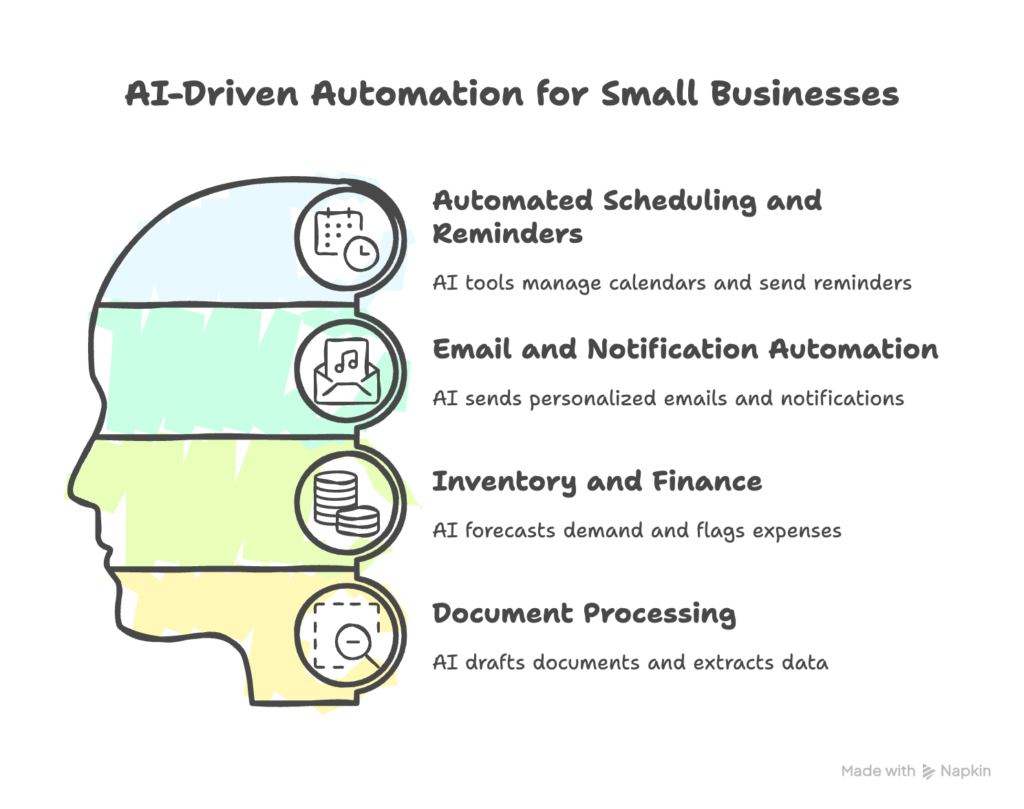
Generative AI for Content and Marketing
Modern AI can also create content. Large language models (like GPT-4) and image generators are increasingly popular in marketing. These generative tools help small teams stay visible and creative. For example, AI can:
- Draft Marketing Copy: Need a newsletter, social post, or product description? An AI assistant can write polished drafts in seconds. It can even tailor tone and length.
- Design Graphics: Generative image tools let you produce custom visuals (ads, banners, social media images) without a designer.
- Optimize Campaigns: AI algorithms can A/B test email subject lines or ad copy by predicting which variants will perform best, so you get higher click-through rates.
- Personalize Customer Experiences: By analyzing customer data, AI can automatically craft personalized promotions or recommendations, boosting engagement.
These capabilities mean small teams can run advanced marketing campaigns on a shoestring. Instead of hiring a full creative team, a founder or intern can prompt the AI and refine its output. And the payoff is clear: businesses in the Salesforce survey listed content generation and marketing optimization as top AI use cases. In fact, 87% of AI‑empowered SMBs say it has helped them scale operations – including marketing outreach – while 86% report stronger profit margins. In short, AI can be a content factory and performance coach all in one, driving real growth from minimal effort.
Measurable ROI: Efficiency and Growth
At the end of the day, small business owners want to see results. The data shows AI delivers. In addition to the 85% ROI expectation and 91% revenue boost noted above, SMBs report tangible gains from AI adoption:
- Higher Productivity: With fewer repetitive tasks, teams accomplish more each day. Salesforce found 78% of small business leaders with AI believe it will be a “game-changer” for their company’s productivity.
- Cost Savings: Automating even one human-intensive process (like data entry or basic customer support) can save tens of thousands of dollars annually.
- Better Decisions: AI analytics turn raw data into actionable insights (e.g. identifying best‑selling products), so owners make smarter investment choices.
Collectively, these gains compound quickly. A small marketing agency, for example, might save 20 hours a week on proposal drafting thanks to generative AI. A retail shop can cut customer service costs in half with chatbots. Over months, these savings pay back the AI investment many times. No wonder Salesforce notes that only 4% of SMBs plan to reduce their AI spending – the rest are either maintaining or increasing investment, confident in the payoff.
In practice, EchoSphere Technologies has seen these benefits firsthand. One of our clients implemented a chatbot and AI‑powered scheduling system and reported 25% higher lead conversion within the first quarter. Another saw a 50% reduction in time spent on inventory management after adding an AI forecasting tool. These are not isolated cases: the trend is clear and data‑backed.
Getting Started with AI: Practical Steps
Adopting AI might seem daunting, but small steps can yield big wins. Here’s a simple approach:
- Identify High-Value Tasks: List routine processes (customer support, scheduling, bookkeeping, marketing) that eat up your team’s time.
- Choose the Right Tool: Pick AI tools tailored to those tasks. For example, use a chatbot platform for support, an AI assistant (like x.ai or a smart calendar) for scheduling, or a generative text tool for content.
- Pilot and Measure: Start with one workflow. Train your team on the new system, run it in parallel with old processes, and measure time/cost saved. Adjust as needed.
- Integrate Gradually: Once successful, expand to other areas. Many AI tools integrate with existing software (CRM, calendars, invoicing systems), so setup is often quick.
- Monitor ROI: Keep tracking metrics (response time, sales, hours saved). The stats earlier (85% expecting ROI, 91% seeing revenue boost) become reality only when adoption is measured and refined.
By following these steps – and partnering with a knowledgeable provider – even very small teams can implement AI reliably. In our experience at EchoSphere, the key is to focus on specific use-cases. Don’t try to automate everything at once. Instead, pick one or two integrations (like a chatbot and an AI writing assistant), ensure they work well, then scale from there.
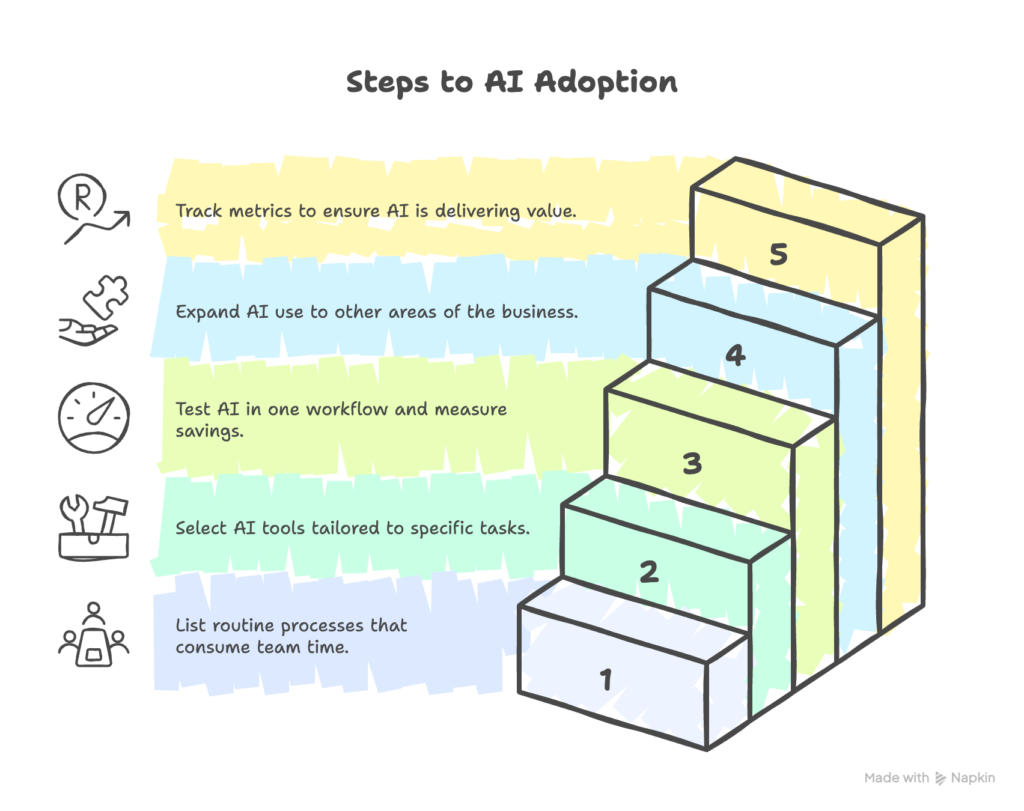
EchoSphere Technologies: Your AI Partner
At EchoSphere Technologies, we help small businesses navigate this AI revolution. Our experts work closely with clients to identify where AI makes sense and implement solutions without headaches. Whether it’s setting up an AI‑powered chat system, integrating a smart assistant, or training staff to use generative AI tools, we guide each step. We also emphasize security and trust – using vetted platforms and best practices so your data stays safe.
Key benefits of working with EchoSphere:
– Customized Solutions: We tailor AI integrations to your specific industry and workflows.
– End-to-End Support: From planning to deployment and training, we handle the technical heavy lifting.
– Ongoing Optimization: We monitor AI performance and make improvements, ensuring the ROI remains high.
Many of our customers start small (a single pilot chatbot or content tool) and quickly expand when they see results. This cautious, data-driven approach aligns with industry best practices and the success patterns identified by Salesforce. EchoSphere’s goal is simple: empower your team with AI so you can focus on growing the business, not busywork.
Conclusion: Scale Smart with AI
AI-driven automation is transforming how small businesses operate. As the data shows, tools like chatbots, virtual assistants, and generative AI are no longer optional extras – they are strategic enablers. By automating routine tasks, small teams gain capacity to focus on creativity, strategy, and customer relationships. This shift already works: a majority of SMBs using AI report higher efficiency and stronger growth[1].
Ready to see what AI can do for your business? EchoSphere Technologies can help you get started. We offer consultations and demos to show how AI tools (from chat support to automated scheduling and beyond) fit your needs. Let us help you implement solutions that save time, cut costs, and boost revenue. Contact EchoSphere Technologies today to explore AI-driven automation tailored for your small business – and watch your team accomplish more with less effort.
Sources: Insights and statistics in this article are drawn from the U.S. Small Business Administration and Salesforce SMB research, reflecting real-world adoption and ROI of AI in small businesses. These studies highlight the tangible benefits seen by SMBs that embrace AI technology.
[1] AI and the Future of Small Business (A Trends Report Recap)
https://www.salesforce.com/blog/ai-and-the-future-of-small-business/

